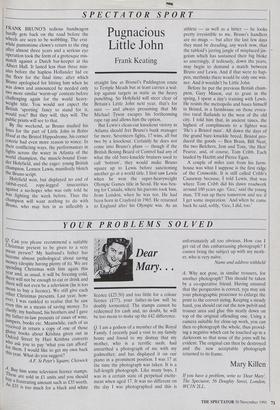SPECTATOR SPORT
Pugnacious Little John
Frank Keating
FRANK BRUNO'S tedious bandwagon hardly gets back on the road before the wheels are seen to be wobbling. The erst- while pantomime clown's return to the ring after almost three years and a serious eye operation took the form of a grotesque mis- match against a Dutch bar-keeper at the Albert Hall. It lasted less than three min- utes before the hapless Hollander hid on the floor for the final time; after which Bruno apologised for hitting him when he was down and announced he needed only two more similar `warm-up' contests before challenging again for the world heavy- weight title. You would not expect the British 'sporting' fancy to stand for it, would you? But they will, they will. The public prints will see to that.
By the weekend, as Bruno studied his lines for the part of Little John in Robin Hood at the Bristol Hippodrome, his corner coterie had even more reason to wince. In their conflicting ways, the performances in fights across the water in Atlanta of the world champion, the muscle-bound Evan- der Holyfield, and the eager, young British champion, Lennox Lewis, manifestly blotch the Bruno script.
Holyfield won, but displayed no end of
rabbit-eyed, ropy-legged insecurities against a no-hoper who was only told he Was fighting the week before. Thus the champion will want nothing to do with Bruno, who may ay box in as inflexibly a
straight line as Brunel's Paddington route to Temple Meads but at least carries a wal- lop against targets as static as the heavy punchbag. So Holyfield will steer clear of Britain's Little John next year, that's for sure — and always presuming that Mr Michael Tyson escapes his forthcoming rape rap and allows him the option.
But Lewis's clean-cut knockout victory in Atlanta should fret Bruno's bank manager far more. Seventeen fights, 17 wins, all but two by a knockout. Certainly he does not come into Bruno's plans — though if the British Boxing Board of Control had any of what the old bare-knuckle bruisers used to call 'bottom', they would make Bruno square up to Lewis before sanctioning another go at a world title. I first saw Lewis when he won the super-heavyweight Olympic Games title in Seoul. He was box- ing for Canada, where his parents took him, from London, when he was ten. He had been born in Crayford in 1965. He returned to England after his Olympic win. As an
athlete — as well as a hitter — he looks pretty irresistible to me. Bruno's handlers are no mugs — but after the last few days they must be dreading, any week now, that the tabloid's jarring jangle of misplaced jin- goism which has sustained their big bloke so unerringly, if tediously, down the years, may begin to demand a match between Bruno and Lewis. And if that were to hap- pen, methinks there would be only one win- ner. And it wouldn't be Little John.
Before he put the previous British cham- pion, Gary Mason, out to grass in the spring, I spent a day's training with Lewis. He resists the metropolis and bases himself in Bristol, in a farmhouse on those evoca- tive rural flatlands to the west of the old city. I told him that, in ancient times, the highest of compliments to a fighter was 'He's a Bristol man'. All down the days of the grand bare-knuckle breed, Bristol pro- duced the goods — Ben Brain, Bill Neat, the two Belchers, Jem and Tom, 'the Hen' Pearce, and, of course, Tom Cribb. Each lauded by Hazlitt and Pierce Egan.
A couple of miles east from his farm- house was what I suppose is the first ridge of the Cotswolds. It is still called Cribb's Causeway because, I told Lewis, that was where Tom Cribb did his dawn roadwork around 180 years ago. 'Gee,' said the young man, 'I'll run up there tomorrow and see if I get some inspiration.' And when he came back he said, softly, 'Gee, I did, too.'










































































 Previous page
Previous page